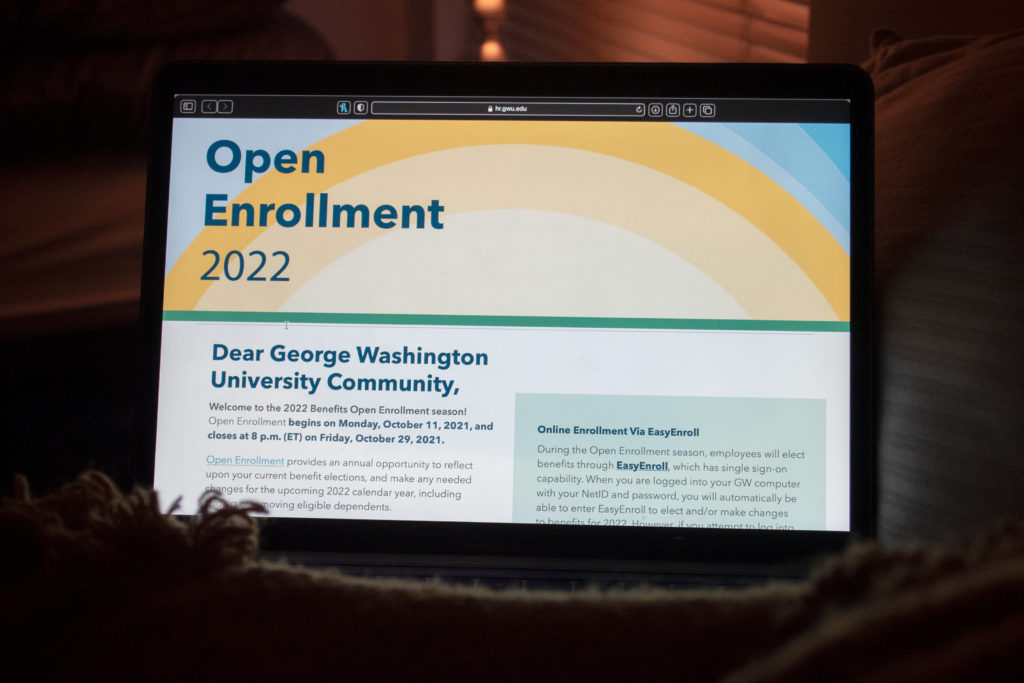Officials are slightly increasing contributions to employee medical coverage and slightly decreasing contributions to employee dental coverage for 2022, according to an annual employee benefits report released earlier this month.
The report states employee medical coverage will increase by 1 percent and dental coverage will decrease by at least 1.5 percent next year. As part of new benefits, employees will have access to an online physical therapy program and a diabetes management program, and officials will eliminate out-of-pocket costs for a list of specialty drugs as of next January, the report states.
University spokesperson Crystal Nosal said officials raised employee medical contributions this year given annual increases in the cost of medical services during the COVID-19 pandemic. She said officials review the utilization of GW’s benefits program to provide employees with “comprehensive” benefit offerings each year.
“COVID certainly made this year’s planning process more complex, as utilization of certain medical services increased, while other types of services were deferred,” she said in an email.
Medical contributions will increase on average by less than $5 per month for about 90 percent of participants in the University’s full-time medical plan, and monthly increases will range from $1 to $8 based on coverage level and salary band, according to the report. The report states medical contributions will increase by $1 per month for those enrolled with GW PPO or the Health Savings, also known as HSP, medical plans, $3 for employees enrolled in HSP with family coverage and $6 for PPO enrolled employees with family coverage.
The report outlines the changes to employee benefits for employees to review in advance of the open enrollment period, which will last from Oct. 11 to Oct. 29, when employees can review benefit selections and add or drop dependents.
Experts in academic human resources said the changes are unlikely to impact employee benefits significantly, and some employees may not even notice the changes.
Fred Foulkes, the founder and director of the Human Resources Policy Institute at Boston University, said the changes to medical and dental contributions outlined in the new plan are unlikely to have a significant impact on employee health plans because most changes are only about a 1 percent increase or decrease.
“I would think it wouldn’t have much impact at all,” Foulkes said. “In terms of the fact that it’s not going to cause people to quit, and it’s not necessarily going to cause people to join.”
Foulkes said the strategy behind creating benefits plans are rooted in the needs of employees.
“With respect to employees in universities, there is so much diversity – you have tenured professors, if you have a medical school that’s a different staff, then you have janitors and secretaries and staff, and they all have different needs, so it’s hard to figure out what’s the common things that most people will appreciate,” Foulkes said.
Robert Roop, a professor of management at Webster University, said employees will likely not notice the “nominal” increase in medical coverage and the decrease in dental coverage.
“Some people won’t even realize it, and some people will be unhappy that their cost is going up and their coverage is going down,” Roop said.
He said the changes are likely correlated with revenue flowing into the University, which could prompt officials to adjust the levels of employee benefits.
“So the University’s expenses, despite their best efforts, are going to go up somewhat, and if their expenses are going up, then they have to, frankly, reduce their expenses so that revenue expenses don’t exceed revenue,” Roop said. “They’re probably doing it out of necessity. It’s not unusual. Everyone’s doing it.”
Chester Spell, a professor of management at Rutgers University, said recovery from the University’s financial mitigation efforts during the pandemic likely influenced the new benefits and relaxed contributions.
“Is it from the pandemic?” Spell said. “Probably, everything is from the pandemic as it seems.”
Spell said though the pandemic was a “shock” to the American health care system, increasing health care costs outside of the pandemic are likely the root of the changes to GW’s benefits plan.
“In general, a trend is employers are trying to shift costs as much as they can, because no matter what we seem to try to do in this country, Affordable Care Act or whatever, health care costs keep increasing,” Spell said.
Caroline Etgen and Mia Adams contributed reporting.







